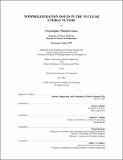Nonproliferation issues in the nuclear energy future
Author(s)
Jones, Christopher Michael
DownloadFull printable version (3.382Mb)
Other Contributors
Massachusetts Institute of Technology. Technology and Policy Program.
Massachusetts Institute of Technology. Dept. of Nuclear Engineering.
Advisor
Ernest J. Moniz.
Terms of use
Metadata
Show full item recordAbstract
The continuing increases in annual greenhouse gas emissions, in the absence of stringent mitigation measures, will produce a doubling of pre-industrial atmospheric concentrations in the second half of this century and a concomitant risk of serious disruption of the climate system, unless less carbon-intensive energy technologies are introduced. The nuclear power option is being discussed much more actively as part of this greenhouse gas challenge. Deployment on the necessary scale must entail establishment of nuclear power and a supporting infrastructure and workforce in many regions of the world, including developing nations. We shall be concerned here with the nonproliferation issues raised by such a nuclear power global growth scenario. In revisiting the issue of nonproliferation and the nuclear fuel cycle, we address two central questions: 1. If a robust nuclear growth scenario is realized, what might it look like, both geographically and technologically? 2. What are the relevant proliferation pathways in the context of this growth scenario, and what actions and studies might be taken to reduce the risk? Our analysis has three components: development of a mid-century demand scenario; discussion of proliferation technology pathways; recommendations that derive from these results. Some of the key recommendations entail: 1. Strengthening of the international safeguards regime, for example by integration of safeguards surveillance and security functions with fuel cycle design and operation. 2. Enhanced focus on enrichment technologies. 3. Timely closure of the back end of the fuel cycle through geological isolation of spent fuel or high-level waste. 4. Focus on fuel cycles that do not yield separated plutonium during normal operation, and control over international cooperative R&D programs. 5. Implementation of suitable international fuel cycle architectures.
Description
Thesis (S.M.)--Massachusetts Institute of Technology, Dept. of Nuclear Engineering; and, (S.M.)--Massachusetts Institute of Technology, Engineering Systems Division, Technology and Policy Program, 2003. Includes bibliographical references (leaves 110-113). This electronic version was submitted by the student author. The certified thesis is available in the Institute Archives and Special Collections.
Date issued
2003Department
Massachusetts Institute of Technology. Department of Nuclear Engineering; Massachusetts Institute of Technology. Department of Nuclear Science and Engineering; Massachusetts Institute of Technology. Engineering Systems Division; Technology and Policy ProgramPublisher
Massachusetts Institute of Technology
Keywords
Nuclear Engineering., Technology and Policy Program.